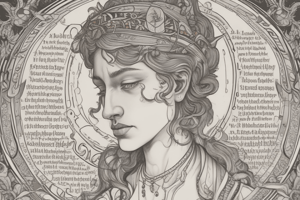Podcast
Questions and Answers
What does lyric poetry primarily focus on?
What does lyric poetry primarily focus on?
- Expressing personal emotions and attitudes (correct)
- Describing historical events
- Telling a detailed story
- Explaining scientific facts
How many lines does a sonnet typically have?
How many lines does a sonnet typically have?
- 14 lines (correct)
- 16 lines
- 10 lines
- 12 lines
What meter is commonly used in sonnets?
What meter is commonly used in sonnets?
- Anapestic hexameter
- Iambic pentameter (correct)
- Trochaic tetrameter
- Dactylic dimeter
Which type of character is referred to as having many traits, both good and bad?
Which type of character is referred to as having many traits, both good and bad?
What term describes a character that remains primarily unchanged throughout a story?
What term describes a character that remains primarily unchanged throughout a story?
What type of literary conflict involves a character working against societal expectations?
What type of literary conflict involves a character working against societal expectations?
What is the primary characteristic of poetry as a literary genre?
What is the primary characteristic of poetry as a literary genre?
In ancient China, which aspect is Early Literature primarily associated with?
In ancient China, which aspect is Early Literature primarily associated with?
Which of these types of conflict is characterized by internal struggles within a character?
Which of these types of conflict is characterized by internal struggles within a character?
Which civilization is credited with having some of the oldest known literary works?
Which civilization is credited with having some of the oldest known literary works?
Flashcards are hidden until you start studying
Study Notes
Lyric Poetry and Sonnets
- Lyric poetry emphasizes personal emotions and attitudes rather than detailed storytelling or historical events.
- The term “sonnet” originates from Italian, highlighting its roots in lyric tradition.
- A typical sonnet consists of 14 lines and often follows a specific rhyme scheme.
- Sonnets primarily use iambic pentameter, a rhythmic meter composed of five pairs of unstressed and stressed syllables.
- The word "sonnet" reflects its short and lyrical nature.
Character Development
- Round characters are fully developed with a mix of traits, showcasing complexity.
- Flat characters remain static and do not undergo significant change throughout the narrative.
- Antagonists serve as the main opposing force against the protagonist, contributing to conflict in the story.
- Static characters do not evolve or change during the progression of the plot.
- Point of view represents the writer’s narrative voice and their attitude toward the subject matter.
Conflict in Literature
- Conflict in literature is defined as the dilemma faced by the character, driving the plot forward.
- Person vs. Society conflict involves struggles against societal norms, highlighting social commentary.
- Person vs. Nature conflict encompasses challenges posed by natural forces, showcasing survival themes.
- Internal conflicts, categorized as Person vs. Self, deal with the character’s inner struggles.
- An unlisted conflict type in the content is Person vs. Fate, representing struggles against destiny or preordained outcomes.
Literary Genres
- Fiction refers to imaginative storytelling and re-creation of life through narratives such as short stories.
- Poetry is derived from the Greek word “Poesis,” which focuses on artistic expression through verse.
- Essays are associated with trying to deal with or explore specific subjects and ideas.
- Drama involves writing intended for performance on stage, blending narrative and theatrical elements.
Ancient Literary Civilizations
- Ancient Egypt is recognized for having some of the world’s oldest literature, contributing greatly to early writing.
- Early literature in ancient China primarily focused on themes of agriculture and pottery, reflecting cultural practices.
- Literature in ancient India emerged from oral traditions intertwined with genealogical storytelling, laying the groundwork for written works.
Studying That Suits You
Use AI to generate personalized quizzes and flashcards to suit your learning preferences.



